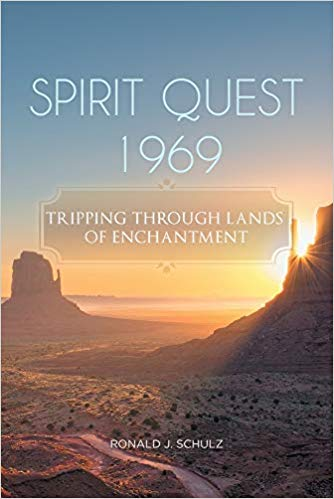Interview with Ronald J. Schulz
Author of Spirit Quest 1969: Tripping through Lands of Enchantment
Ronald J. Schulz Book is a new author who insists on writing true stories. Born in Chicago, Ronald grew up in the suburb of Wood Dale, Illinois, longing for a more meaningful life. At fifteen he ran away to New Orleans, where he lived on Skid Row until betrayed by a priest. As a disaffected seventeen-year-old high school dropout in 1969, Ronald took LSD while hitchhiking into the western American counterculture. He also became involved in radical movements in New York and Chicago, including the SDS Days of Rage. Arrested and subjected to several months in a mental hospital before he joined a Wisconsin commune, which remained his home throughout the 1970’s. In 1975 he hitchhiked from across North Africa and the Middle East, spent time on a kibbutz and working at a copper mine in Israel’s Negev desert. Then on to India and Nepal, where he spent nine months studying Buddhism under Lama Yeshe. His life has been full of adventure, travel, and different jobs, including teaching English classes in Tokyo, construction work in Los Angeles, and mining in South Dakota and Colorado. Ronald has a BA in political science from the University of Washington, as well as certificates in memoir writing and teaching English as a second language. He has been to every continent with the exception of Antarctica. Currently, he lives in Seattle, where he’s a member of Hugo House and the Seattle Writers Meetup Group.
Buy this book
How would you describe Spirit Quest 1969: Tripping through Lands of Enchantment to a new reader?
- It’s an honest rendering of the thoughts, emotions and experiences of a teenage boy, a rebel, whose conscience cannot accept the social norms he’s born into. He seeks adventure and fulfillment on the road, barging into new situations to make sense of life’s alternatives.
What was the inspiration behind Spirit Quest 1969: Tripping through Lands of Enchantment?
- My life experiences during the dramatic 1960’s, which I’m exposing to the world for the first time. While each of us is a part of the grand sweep of events we call history, too few of us record our experiences for the benefit of our own and future generations, leaving big holes in how history is understood. I’ve come to regard this storytelling as something of a duty, especially for those of us who survive passed fifty, an age many of our ancestors never reached. The full exposure of our social history ought not to shrink at difficult subjects. Sex and unfashionable or controversial activities have too often been whitewashed from past histories, leaving our heroes, our Washington’s, even our villains, edited as false one-dimensional characters. They were not! Only the deep researcher can discover something more visceral and pithy that motivated their lives.
Which authors do you admire? How have they influenced your writing style?
- We’ll step back in time here to my formative years. The Torrents of War, by Igor Šentjurc, was the first adult novel I read when I was eleven years old, while awaiting an operation in the hospital. It is told from a World War Two, German soldier’s perspective. That is to say, I entered a number of individual enemy minds, which helped me understand and even empathize with characters beyond my experience. Our enemies had only been taught as stereotypes of evil monsters in my history class, but of course they were more complicated and human, and not altogether different from people I knew who were the "good guys" in my historical period. I try to understand what makes people tick, beyond the labels of good vs bad. Sometimes they switch places.
I Cannot Forgive by Rudolf Vrba came next. The story of his survival and even thriving to escape the Nazi death camp thrilled and helped inspire me to live life with boldness whatever the challenge and I try to convey that on the page.
I enjoy Non-fiction works, most recently Chaos: Charles Manson, the CIA, and the Secret History of the Sixties by Tom O'Neill, which is relevant to this topic.
Can you tell us a little about the locations in your book?
- The action begins on the road south of Denver, Colorado, followed by flashback to my hometown in Wood Dale, Illinois, but most of it takes place in Arizona and New Mexico.
What advice would you give to aspiring authors? How would you advise a new author about traditional publishing versus self publishing?
- Find your passion and live the adventure out loud as you write. Let it bounce around your heard while you’re busy with other things and keep a notepad handy for insights. People worry too much about style and technique, which is good up to a point, but having a story you feel bursting out of you counts for much more. Then comes editing and listening to advice, but beware, they may not share your passion for the subject. Find the right readers. As to publishing, I’m too much a newbie to give advice on that. It’s all about marketing and finding a niche these days. Be prepared for a ton of rejections. Even if a teacher, beta reader, or writing coach loves your work, it’s hard to find the right agent or editor who welcomes YOU. Reevaluate, but don’t give up on what’s meaningful to you. Ultimately, we succeed by any means necessary.
What's your writing process?
- It’s like making love. Sometimes I start slow and then build the intensity. As a passionate person, I need to get fired up and throw myself into it, channeling deep memories that I jot down to be fleshed out later. Even so, there follows cuddling, proofreading, editing and reediting the work, but don’t let the passion fade. You just have to love it.
Which character in Spirit Quest 1969: Tripping through Lands of Enchantment has had the greatest impact on readers?
- That would be Joe Sage. He was a complicated mix of characteristics, whose lack of anger management sabotaged the good in his personality. I would like to research him more, but his trail seems to have been obscured, perhaps deliberately. In an article in the Berkeley Barb Joe claimed to be on the run for eight years in fear for his life from the Manson family, due to the publicity after he appeared in the book Helter Skelter: The True Story of the Manson Murders by Vincent Bugliosi. I suspect he may have been a pawn in the CIA-FBI misinformation and culture war mentioned in Chaos: Charles Manson, the CIA, and the Secret History of the Sixties by Tom O'Neill. There are many layers to history and we may never find them all.
If Spirit Quest 1969: Tripping through Lands of Enchantment were to be adapted for TV or film, who would you see in the lead role? Who did you have in your mind’s eye when you wrote him/her?
- I promise to get back to that! I don’t know enough young actors. I would say someone like a young Tom Hanks, which is my daughter's suggestion.
How have readers responded to Spirit Quest 1969: Tripping through Lands of Enchantment?
- They love it, but the book has only come out a few days ago, we’ll have wait and see how it does.
Where next? What are you working on now?
- I’m continuing my journey through the adventurous sixties to be published in bite sized pieces, rather than huge, intimidating volumes. My next focuses on the urban street scene in Chicago and New York, with the New Left struggles for substantial political change and the sometimes uneasy relationship with the emerging hip culture and Right wing backlash. I hope to publish it later this year. Stay tuned!
Synopsis
It’s 1969 and the world is on fire. Ronald was seventeen years old, dropped out of high school near Chicago to explore the counterculture in the Rocky Mountains. After taking a huge dose of LSD, he wandered into the Navajo reservation seeking supernatural visions, meeting missionaries and students of Indian lore. He joined a group marriage commune in Taos at the height of the Hippie-Chicano conflict. His adventures exploring the street scene and New Left in Chicago and New York, will soon appear as a follow-up book.

